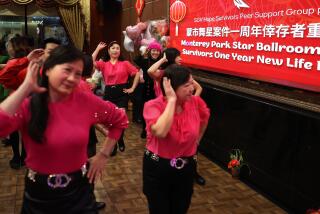Silence of Witnesses Is Hindering Murder Case : Crime: Traditional reluctance of Asians to talk to police has hampered inquiry into graduation night shootings. San Marino officers seek help of cultural experts.
- Share via
More than a month after gang members opened fire on a San Marino graduation party, killing two youths and wounding seven others, police still have made no arrests.
The reason, authorities say, is silence from witnesses, many of them Asian Americans who traditionally do not cooperate with law enforcement officers.
That cultural phenomenon, well-known in many cities, seems to have caught police in this affluent and generally peaceful city off guard. Although nearly a third of San Marino’s 13,000 residents are of Asian heritage, police are just now turning to experts on Asian crime and culture for a quick lesson on how to bridge cultural differences and communicate more effectively with residents.
“We didn’t anticipate to what extent some witnesses would be reluctant to talk to us,” admits San Marino Police Chief Frank Wills.
More than 100 young people, most of them Asian American, were at the Lombardy Place party where the shooting occurred in the early morning of June 5. Dennis Buan, 18, of South Pasadena, and David Hang, 14, of San Marino, were shot and killed by a group of up to 12 gang members who had been kicked out of the party earlier and returned just as it was ending.
*
At least 15 party-goers witnessed the shooting, Wills said. One witness even argued heatedly with gang members, face to face and inches away from them, shortly before they chased him on foot to the back-yard party site and opened fire, he said. Yet, when police interview witnesses, the young people say they don’t know anything or anybody or can’t identify people, said Sgt. Lily Hadsell, a detective on the case.
The number of witnesses, many of whom are not involved in gangs and are from upstanding families, made for favorable initial “solubility factors,” as Wills calls them. It prompted his optimistic public statements early in the case that suspects would be arrested within a matter of days.
But fear and discomfort around police quickly silenced some key witnesses, Wills said.
In one instance, a youngster who appeared initially cooperative and willing to talk to investigators was sternly warned in Chinese by a parent to say nothing, said Det. Tricia Gough, another investigator on the case. Afterward, when the English-speaking detectives sat down to interview the youth, the teen-ager suddenly would only relate the barest of details. Detectives came away with nothing usable, Gough said.
“The young people have told us that, among Asians, any contact with police is bad, even if you are the victim,” Gough said. “They believe that, if you talk to police, it means you have done something wrong.”
Although many of those questioned by police have been unfailingly polite, investigators sense that information is being withheld, Wills said.
“For the most part, people are afraid,” the chief concluded. “The other part is that they don’t want to have their names involved with a police investigation.”
Such reluctance among law-abiding, well-educated and economically well-off Asian Americans is not surprising, said San-Pao Li, a professor of Asian studies at Cal State Long Beach.
“The better the family, the less they want to get involved,” Li said.
Any involvement with law enforcement or the legal system is traditionally considered a disgrace in China, he said. Disputes are supposed to be solved by elders or local gentry, not in court, he said.
“Even today a person involved in a lawsuit is considered a problem person,” Li said. The same applies to those who have dealings with police, he added.
Many Asian Americans also believe that the cultural ideal of peace and harmony is shattered when witnesses, however innocent, talk to police. Initial statements can lead to more involvement and a shattering of valued peace and harmony, Li said.
Fear also silences Asian Americans who are victims, not of random crimes of opportunity, but of well-planned robberies or extortions, said Jones Moy, a sergeant with the Monterey Park Police.
Asian American victims know that often their assailants have planned crimes against them in detail, learning about their family life, their phone numbers and where they work. Accordingly, they fear reprisals and lack faith in the American legal system, where accused criminals are freed on bail and trials can take up to a year or more to get to court, Moy said.
“During that whole year, they live in fear of what might happen to them,” the sergeant said.
Overcoming such reluctance takes time and special effort, Moy said. His own city, whose population is more than 56% Asian American, recognized in 1978 its changing demographics and created a special unit to reach out to Asian Americans.
Now, a quarter of Monterey Park’s police force of 80 officers is Asian American, Moy said. And the special law enforcement team is building trust between police and Chinese business owners and young people. Some now feel confident enough to call or page officers at the first sign of trouble, Moy said.
San Marino police are consulting with experts on Asian gangs from the Sheriff’s Department and surrounding cities such as Alhambra and Monterey Park, Hadsell said.
Despite San Marino’s unexpected cultural roadblocks, Wills is cautiously optimistic about solving the graduation party murders. Police are re-interviewing witnesses in hopes of persuading them to give information, he said, and are building up physical evidence.
“We’re far from having reached a dead end,” he said.
More to Read
Sign up for Essential California
The most important California stories and recommendations in your inbox every morning.
You may occasionally receive promotional content from the Los Angeles Times.













